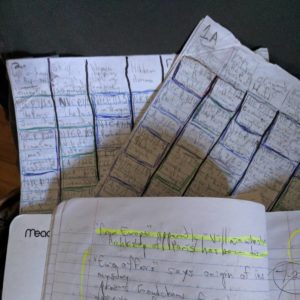Last week, a librarian at the University of Cape Town emailed me some scanned items from their archives which I requested for my Junior Paper research. I’ve looked through them, and I can see that they will be quite useful for my work.
While I am glad that I have access to these sources now, they also add to a problem I had before I received them: in the research work I have been doing, I have what seems like too many materials to work with. During my time over spring break at the New York Public Library and Center for Jewish History, I amassed literally hundreds of newspaper and journal articles as primary sources.
At first, I was unsure of what to do with all of them. It simply seemed an overwhelming task to sift through them to figure out what was needed for my work (this is where having a clear yet flexible research question comes in handy; see my post here on that). A similar thing had happened to me this summer when I was working on a research project likewise involving hundreds of newspaper articles, and I do not think I dealt with it as well as I could have then. So, reflecting on these mistakes, I worked out some strategies to make things more manageable this time around. I hope these to be helpful for any student researcher who feels like they’re buried under a mound of potential sources:
Work in Batches, and Time Yourself: All in all, I counted around 200 source articles scanned on my laptop that I have to work with, and I do intend to at least skim through all of them (this, I admit, may not, in the end, be necessary). So, I began working in batches- looking through ten articles at a time and then going on to do something else. Noting my start and end times for each batch, I figured out it took me roughly an hour to finish a batch of ten. Now, I know just around how long it will take me to finish going through all the articles, allowing me to set personal deadlines and budget my time effectively. As of now, it seems I am on track for this week!

Type Your Notes: Last summer, I hand-wrote all my source notes. Now, while my stack of filled-in marble composition notebooks does look nice, it takes me a long time to find any given specific note detail inside, if I can find it at all. Typing your notes on a separate document, as I have been doing for my JP work, gives you the ability to keyword search, which you will thank yourself for during the writing process when you want to find key information to include in your paper.
Categorize Wisely: With my summer work, I knew I was looking for some recurring patterns in the newspaper articles I was reading—for example, when a certain word was used repeatedly to describe an event, or when certain reports were copied verbatim from paper to paper. So, my notes ended up in a sort of grid, with about twenty different categories under which I organized newspaper articles. Of course tracing the patterns was integral to my work, but in the end, these categories became too much to organize anything effectively. Sometimes they were far too specific, and at other times resulted in some pretty ambiguous groupings. This is not to say you shouldn’t categorize, but rather that you should stick to a couple key concepts to organize your thoughts. My strategy with my JP notes is to type themed category words next to notes on an article if relevant. That way, I can keyword search a theme (again, the benefit of typing notes), and immediately see which articles match.
Hopefully, these tips will make any seemingly impenetrable wall of source material into something less imposing. From personal experience, when working with the organizational tools above, I fall into a pretty satisfying productive groove. And, even if you do not seem to have too many sources to work with, these strategies can help make sure you stay on track with your research, and keep your materials accessible when the time for writing comes.
—Alec Israeli, Humanities Correspondent

